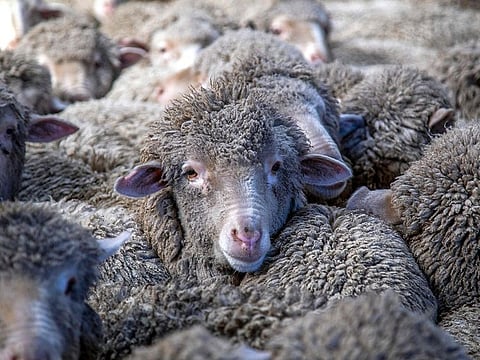Greece bans sheep transport as new plague cases found
The outbreak has led to the cull of thousands of animals

Athens: Greece's agriculture ministry on Monday banned the transport of sheep and goats around the country as a highly contagious ruminants plague surfaced in more areas following a July 11 outbreak.
The outbreak, which officials linked to imported livestock, has led to the cull of thousands of animals in the Mediterranean country, with nearly 10,000 earmarked for slaughter.
"The movement of sheep and goats for breeding, fattening and slaughter is banned across the country," the ministry said in a statement.
It said its vets had found cases of sheep and goat plague in the regions of Corinth and Larissa after tracing "the route followed by animals imported from a specific country".
Later Monday, another case was found in the greater Athens area west of the capital, deputy agriculture minister Christos Kellas told state broadcaster ERT, bringing the total number of animals affected to more than a dozen.
The sick animals were located before symptoms of the disease developed, the ministry said.
Officials did not name the country the animals were imported from.
But the ministry has already said that Greece mainly imports sheep and goats from Turkey, Albania and Romania.
Romanian officials declared an outbreak of the disease on July 19, eight days after the first cases emerged on a farm in Baia near the Black Sea coast.
By July 26, the virus had spread to several Romanian farms, with Romanian authorities culling nearly 58,000 sheep and goats in response.
"If they came from Romania, they entered freely," Kellas told Skai TV.
"Animals are not checked at the border [when entering] from an EU country," he said, adding that Romania had not declared an outbreak before the first cases in Greece.
More than 9,000 animals have been identified for culling, including 7,000 already killed in central Greece after the disease surfaced near the town of Kalabaka on July 11.
Kellas called Greece's response to the outbreak "the largest veterinary operation ever carried out in the country".
Last week, a senior veterinary official in the area was replaced after it emerged that some of the sheep had been buried alive, the local governor said.
The disease, known as Peste des Petits Ruminants (PPR), is highly contagious to sheep and goats but does not affect humans. Meat and pasteurised milk are also safe to consume, officials said.
The Greek agriculture ministry has said it is the first time the disease has been detected in the country.
Greek farmers increased animal imports after local flocks were decimated in last year's disastrous floods caused by Storm Daniel, when tens of thousands of sheep perished.
Sign up for the Daily Briefing
Get the latest news and updates straight to your inbox



